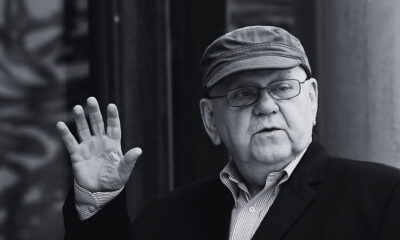English
Russian vodka factory in Montenegro to circumvent EU sanctions

A Russian businessman has established a company in Montenegro with the aim of producing vodka for export to the European Union. The Montenegrin factory, owned by Noblewood Adriatic, founded by Alexander Mechetin, former CEO of one of Russia’s largest vodka distillers, Beluga Group, will employ around 300 workers and produce approximately 30 million bottles of Beluga vodka annually, with a total value of around 500 million euros. Montenegrin Prime Minister Dritan Abazović attended the factory’s opening on Thursday, April 13th.
The circumvention of sanctions
Last December 7th, the Russian news agency Interfax reported that Alexander Mechetin had resigned from his position as CEO of Beluga Group, which the board of directors accepted at his own request.
Mechetin, who had led the Beluga Group for more than 20 years, sold almost 19% of his shares at the same time as his resignation, reducing his ownership from 58% to 39.38% and consequently losing his majority ownership status in the company.
Following this, the Russian vodka distiller established the company Noblewood Adriatic in Tivat, Montenegro, which naturally and not coincidentally specializes in vodka production, allowing the Russian businessman to continue his previous activities, which had been severely affected by EU sanctions against Russia, through circumvention of these sanctions.
In Montenegrin media and public life, Mechetin is mentioned as the owner of Noblewood Adriatic, but the Montenegrin registry lists a certain Vitaly Enin as CEO, for whom no public data is available, suggesting he may be acting as a frontman.
According to the Montenegrin news portal, Standard, Macsetyin is among the few Russian oligarchs whose name has not yet been added to the European Union’s list of sanctioned Russian businessmen. However, since the list is updated monthly, it is possible that delay does not mean exemption.
The Russian vodka tycoon allegedly took advantage of the economic citizenship program launched by Malta and Cyprus in 2013, earning millions of dollars for the two island nations.
While it is unclear when Macsetyin became a Maltese citizen, it is certain that he acquired it before 2018. It is also possible that he may have appeared in Montenegro as a Maltese or Cypriot citizen, which could complicate the sanctions game.
The Serbian connection
Last August, the Russian businessman, then the head of the Beluga Group, bought the Nikšić-based Neksan company, reportedly investing 50 million euros in it.
The previous owner of Neksan was Miodrag Daka Davidović, who was shot and wounded by a sniper in Belgrade in December 2019 while in exile due to his connections to Serbia and Russia, enjoying the support of the Serbian Orthodox Church leaders.
Davidović was allegedly involved in cigarette smuggling in the 1990s, which was a lucrative industry in former Yugoslavia where tobacco products were in short supply. He was arrested in 1997 after confronting Montenegro’s now-toppled president, Milo Đukanović’s political agenda.
In the 2000s, the Montenegrin politician and businessman was involved in a fictitious petrol delivery case related to the then-newly independent Kosovo, but the Montenegrin prosecutor’s office never confirmed the allegations.
In 2021, Davidović founded a Serbian political party called the People’s Movement in Montenegro, which supported Jakov Milatović, the newly elected president, in the second round of the Montenegrin presidential elections, unsurprisingly since Milatović is a member of the Serbian Orthodox Church.
 Miodrag Daka Davidović campaigned alongside Jakov Milatović on his barely used LinkedIn profile (Source: LinkedIn)
Miodrag Daka Davidović campaigned alongside Jakov Milatović on his barely used LinkedIn profile (Source: LinkedIn)
In August of last year, according to a report by Radio Free Europe, the Montenegrin Ministry of Finance did not create any obstacles to the purchase of Neksan. The ministry considered the transaction to be an agreement between two businessmen, rather than a violation of sanctions. Furthermore, they emphasized that the purchase would result in the creation of 300 new jobs.
According to the Standard portal in Podgorica, the opening of 300 new jobs sounds good, and is enough to demonstrate to the population of the Balkan country that Montenegro can attract new investors even in difficult times, even if they come from an “aggressor country” and finance their economic activity with questionable capital.
Russian vodka from Montenegro
The opening of the Russian vodka factory in Montenegro on Thursday was attended by Prime Minister Dritan Abazovic, who emphasized that a large portion of the vodka produced in Montenegro is exported.
– This is a big day for Montenegro because global brands are coming, and the economy will finally become export-oriented. The products produced in this factory will be exported to more than 100 countries this year alone, and the ratio between imports and exports will improve
– said Abazovic, who was very enthusiastic and described how much glory awaits Montenegro as bottles labeled “Beluga Montenegro” appear all over the world.
The new management of the factory also supports this idea, stating that the Russian vodka produced in Montenegro will be available at nearly 300 airports around the world, circumventing EU sanctions.
Abazovic pointed to a shipment of vodka in a Montenegrin government video attached to the article, stating that it was headed for New Jersey, USA.
The Montenegrin Prime Minister of Albanian origin emphasized that the Niksic factory employs nearly 200 workers, while 50 are employed in marketing in Tivat.
However, this is just the beginning. Abazović envisions that according to the plans, the company will employ 400 people by 2025.
The executive Montenegrin prime minister believes that the factory is so good that the United States, Germany, or France would not be ashamed to have a factory like the one now established in Nikšić.
Of course, the ceremony did not address how the Russian presence behind the world-class investment can be interpreted in the case of Montenegro, which is declared to be seeking to join the European Union, and how the whole story relates to EU sanctions, whether we like them or not.
-

 Szerbia7 nap telt el azóta
Szerbia7 nap telt el azótaDodik tagadja a srebrenicai népirtást, Vučić pedig küzd a boszniai szerb álláspontért
-

 Szerbia6 nap telt el azóta
Szerbia6 nap telt el azótaA jelek szerint Szerbia nemcsak Ukrajnának, hanem Izraelnek is szállít fegyvert 🇮🇱🤝🇷🇸
-

 Szerbia5 nap telt el azóta
Szerbia5 nap telt el azótaMagyarország nem támogatja Koszovó ET-tagságát, sem a Srebrenicáról szóló ENSZ-határozatot
-

 Szerbia5 nap telt el azóta
Szerbia5 nap telt el azótaCsapást mérhet-e a szerb Panda a kínai elektromos autókra?



































































